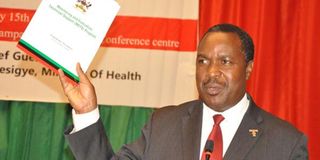Government considers housing new cancer machine in the existing bunker

Minister for health Dr Elioda Tumwesigye
The Health Minister has revealed that the government is exploring the possibility of housing the new radiotherapy machine in the existing bunker to quickly restore the modality of treatment to the patients in need.
The Cobalt 60 radiotherapy machine, installed at Mulago hospital in 1995, broke down beyond repair last month. Its replacement is not due for at least one year due to the absence of a safe bunker to house a new one.
Radiotherapy is a type of cancer treatment that uses beams of intense energy to kill cancer cells. Delays in placing the machine in an appropriate bunker, has left about 2,000 cancer patients with unbearable pain.
However, in an interview with the Daily Monitor, the minister for health Dr Elioda Tumwesigye said: “We are trying to get the technical assessment of the existing bunker to see whether it can be able to house the new machine in the coming weeks.”
He added that the assessment report will be discussed at a meeting to be held this week, but he was not specific on the date.
In an interview, the director of the Uganda Cancer Institute, Dr Jackson Orem indicated that the existing bunker had been found unsafe to house the new cancer machine.
“The cobalt machine is still in Vienna where it was purchased because we do not have a bunker where it is supposed to operate for safety reasons since it uses atomic energy,” Dr Orem said.
He said that the International Atomic Energy Agency (IAEA), a body that regulates nuclear and atomic medicine, had recommended construction of a new bunker if the machine is to be delivered into the country.
Roko Construction Company Limited, the company also working on construction at Mulago Hospital, has been contracted to construct the bunker.
While commenting on the current contradiction on the number of patients to be treated in Nairobi, Dr Tumwesigye said that the letter communicating the offer was not clear. He added that a meeting has been scheduled to clarify on the matter.
Dr Orem was quoted by the Saturday Monitor at the weekend, saying that patients with advanced cancer will not be sent to Aga Khan University Hospital as preference was to be given to patients whose cancer is just starting to develop.
He also revealed that the treatment to be offered caters for 400 doses not 400 patients. The State Minister of health for General Duties, Dr Chris Baryomusi had earlier told Parliament that the Nairobi-based hospital had offered to treat 400 patients.
According to Dr Joseph Kigulu Mugabe, the former head of the radiotherapy unit at Mulago, a patient on curative radiotherapy treatment requires between 25 to 30 doses of treatment.


